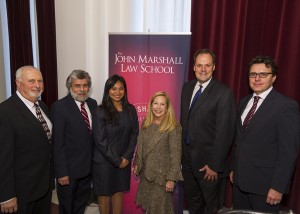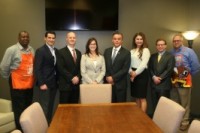
Laurel Bellows (center), addressed the topic of human trafficking as the guest presenter for the Fred F. Herzog Memorial Lecture on April 8. At the program, jointly presented by John Marshall and the Chicago Bar Association (CBA), she was joined by (from left) Professor Gerald Berendt, program chair; Associate Dean Ralph Ruebner; CBA President Aurora Abella-Austriaco; Professor Mark E. Wojcik; and Austrian Consul General Thomas Schnoell.
More than 100,000 American citizens and an untold number from other countries are modern-day slaves in the United States, according to American Bar Association (ABA) president Laurel Bellows.
Bellows delivered the Dean Fred Herzog Memorial Lecture on Monday, April 8, 2013, at The John Marshall Law School in Chicago. That was Holocaust Remembrance Day and Herzog, who left his native Austria when Hitler invaded, was a long-time champion of human rights.
Bellows’ topic was “Human Trafficking,” but she noted that the term seems too innocuous for the reality; more like methods of moving people around than of holding people against their will and forcing them into sometimes years-long nightmares of unpaid labor and unwanted sex.
The U.S. State Department estimates that 21 million people worldwide–80 percent of them women and children– are modern-day slaves. And Bellows noted during her lecture that the trafficking produces $32 billion in profits each year for its criminal entrepreneurs, making it more lucrative than almost any other illegal activity.
“When you capture a human being, you can use that body infinitely until he or she dies,” Bellows said.
The ABA is spearheading an initiative to combat human trafficking through public awareness, advocacy and education. Bellows said the ABA is training judges, law enforcement officials and attorneys to recognize victims as many enter the criminal justice system as defendants who are unable or afraid to reveal their situations to officials. For many, she said, “This is a silent crime, a silent horror.”
Bellows believes it is possible to break the cycle of human trafficking by galvanizing the general public. Education is an important way of training the average citizens who may come into contact with the victims. Learning questions to ask that may help confirm one’s suspicion that someone is in trouble is one way to uncover the crime. With a bit of knowledge, a call to the Polaris hotline, which takes tips about suspected human trafficking, could help save a life.

